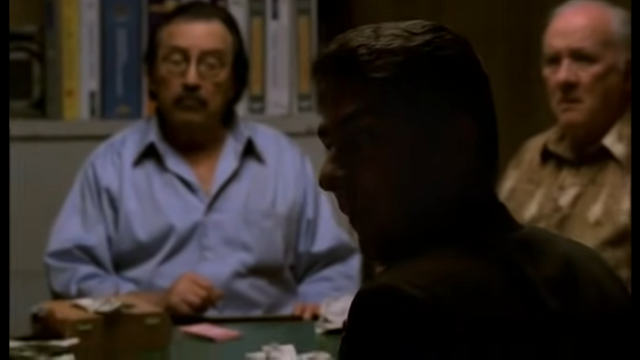One of the many addictions enjoyed by Terence McDonagh, protagonist of Bad Lieutenant: Port Of Call: New Orleans is gambling. On top of all his other problems, he’s deep in debt to his bookie, and even when he swings a way out of it he makes even more ridiculous bets – including one he manages to turn to his advantage by pulling over the right footballer at the right time and blackmailing him. There’s a scene I’ve always been struck by, in which McDonagh walks into a bar and asks a guy about how a game turned out. After the guy explains, he asks McDonagh if he wants to hear any of his tips, and then Nic Cage makes an absolutely strange acting decision: he pauses for a moment, looking towards but not at the camera, then sharply turns to the guy and says “Does it look like I wanna hear ’em?” For a second there, yeah, it did! It makes McDonagh look even more impulsive and even more committed to his impulses.
Star Wars: Knights Of The Old Republic contains a minigame called Pazaak that strongly resembles blackjack. Two players compete head-to-head, laying down cards in order to get the highest total amount without going over twenty. The distinction from real blackjack is that you can buy cards as you travel through the galaxy, building a deck out of whatever cards you can find and want. Pazaak is the result of two separate traditions that KOTOR is adhering to. The first is the scifi tradition of inventing as much as you can think of, even if you’re just rebranding something old to be slightly different (shades of Stringer Bell rebranding drugs in The Wire). If you write a space story, it’s expected that you’ll come up with your own alien race and culture; compare to high fantasy, in which creating a fictional race is nice but as long as you have dwarves and elves and orcs and stuff like that, you’ll be fine. The second tradition is that of the gambling minigame. Role-playing games – and later, open world games – will almost always have some small gambling minigame. These are usually incredibly boring and not nearly worth the time and effort; most players skip right over the Pazaak section of KOTOR unless they really want to dive into everything, because you get like 40 credits for a fifteen minute game.
One of the things from The Sopranos that stuck with me was the episodes centered around illegal gambling, because it was one of the few times the system the characters operated in made much sense outside of the banal inertia of tradition. The mobsters want to gamble, so Tony supplies a place they can gamble and acts as moderator. There was tradition and a sense of joy inherent in the act, but it also made economic sense, which isn’t as clear for a lot of what Tony does. It’s also attached to one of the more fun plots in the series, when Jackie “Poo-Ass” Jr, inspired by a story of his father, tries robbing a poker game to make a name for himself. He makes many mistakes in the process, teaming up with inexperienced friends who get high before the robbery and panic under pressure. He also simply has the bad luck of targeting a game in which Christopher is playing. This is a rare moment of Chase allowing a main character to ever really look cool; Christopher keeps his head, tries to deescalate the situation while making the terrible consequences for engaging in the robbery clear, and proves a good shot when things turn violent. It signifies another turn in Christopher’s development and how he has risen in the ranks of the Mob.
Roald Dahl wrote adult short stories before he got famous for children’s fiction, and these were very much in the American tradition of short stories in which the writer is trying to build you up to a gruesome twist. His second-most famous short story is “The Man From The South”, about a gambler who plays for stakes as high as body parts. I’ve never been one for games of chance – not out of any moral concern, I just never saw the sense or fun in a game in which I, to paraphrase Jim Cutler, have no say in the outcome. Poker, basketball, or Left 4 Dead 2 are fun because even as chance factors into them, I still have decisions to make; the only meaningful decision in roulette is whether or not to play at all. “The Man From The South” and Uncut Gems are the only works to really make me get on a deeper emotional level the appeal of gambling on games of chance – of taking a tremendous leap of faith in which your gut will lead you to either glory or death. Of course, both works also sell why I’m skeptical of gambling on games of chance in the first place; I’m pretty happy to still have all my fingers.
What are your favourite examples of gambling in fiction?

